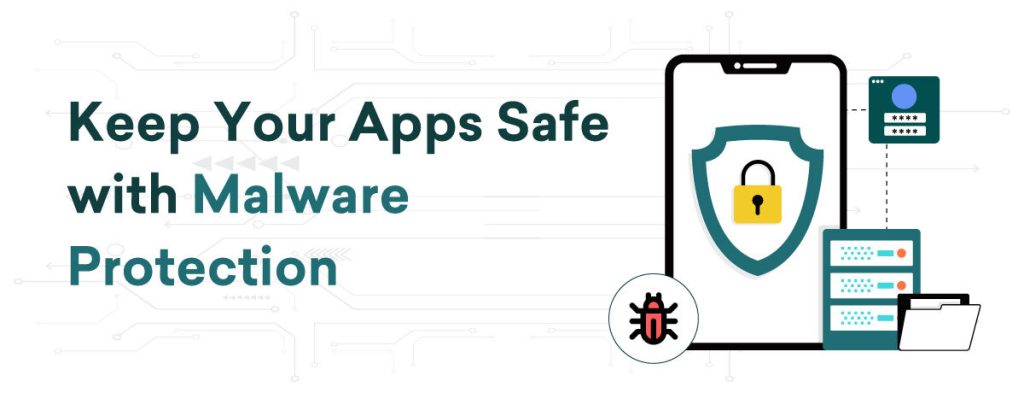Keep Your Apps Safe with Malware Protection

Malware attacks are frequent in today’s digital environment and can damage your applications. The purpose of malware, often known as malicious software, is to corrupt, steal, or interfere with an application’s ability to operate normally. Your apps might become sluggish, unreliable, or even unusable without protection. Malware Protection is crucial for this reason.
What is Malware?
Malware is any software created to cause harm. It can come in many forms, such as viruses, worms, ransomware, spyware, and trojans. These programs can attack your system, steal sensitive data, or use your application for malicious purposes. Once malware infects your application, it can lead to data loss, unauthorized access, or even financial loss.
Why Malware Protection is Important
Malware protection is like a shield that guards your applications from cyber threats. If malware enters your application, it can affect its performance, make the application vulnerable to hacking, and cause it to crash. Malware protection tools can prevent these attacks before they happen, ensuring that your application runs smoothly and remains secure.
Without proper protection, your applications are at risk of being attacked. Hackers could steal important data, infect users’ devices, or take control of your system. This could result in financial loss and damage to your business reputation.
Steps to Secure WordPress for High Performance
Use Strong Passwords and Two-Factor Authentication: Strong passwords make it harder for hackers to guess or crack them. Two-factor authentication adds an extra layer of security by requiring users to verify their identity with something they know (password) and something they have (like a phone or email code).
Keep WordPress Core, Themes, and Plugins Updated: Updates often include important security patches. By keeping your WordPress Security installation, themes, and plugins up to date, you close security gaps that hackers might exploit. Outdated software can slow down your website and make it more vulnerable to attacks.
Install a WordPress Security Plugin: There are several security plugins available that can help you monitor your website, block malicious traffic, and scan for potential threats. Popular options include Wordfence, Sucuri, and iThemes Security. These plugins can automatically block suspicious activities and alert you to any vulnerabilities.
Secure Your Website with SSL: An SSL certificate encrypts data exchanged between the user and the website, protecting sensitive information like login details and payment data. Not only does SSL improve security, but it also helps boost your website’s ranking on search engines.
Limit Login Attempts: Hackers often use brute-force attacks to guess passwords by trying multiple combinations. Limiting login attempts ensures they can’t keep trying after a few failed attempts. This reduces the chance of someone breaking into your site.
Back-Up Your Website Regularly: Backups are an important part of security. If your site is compromised, having a recent backup can help you restore it quickly without losing data. You can use plugins like UpdraftPlus or BackupBuddy to automate this process.
Use a Web Application Firewall (WAF): A firewall acts as a barrier between your website and potential threats. It filters traffic and blocks harmful requests before they reach your site. Many hosting providers offer firewall services, or you can use a security plugin with built-in WAF features.
Disable File Editing in WordPress Dashboard: By default, WordPress Security allows administrators to edit theme and plugin files directly from the dashboard. While convenient, hackers can exploit this feature if they gain access to your admin panel. Disabling this function adds another layer of protection.
Choose a Secure Hosting Provider: A good hosting provider plays a big role in your website’s security. Managed WordPress Security Hosting services often include security features such as automated backups, malware scanning, and firewall protection. A reliable host can also prevent DDoS attacks that could slow down or crash your site.
Monitor and Audit Your Website: Regular monitoring and auditing can help detect unusual activity or vulnerabilities. You can use plugins or third-party services to track file changes, login attempts, and site performance. Early detection of issues can help prevent bigger problems.
How Security Enhances Website Performance
Good security practices protect your website and help it perform better. Malware infections and hacking attempts can slow down your website, affecting the user experience. By keeping your site clean and secure, you ensure it runs smoothly and quickly. Moreover, search engines prioritize secure websites, meaning your site could rank higher in search results.
Conclusion
Securing your WordPress site is an ongoing process. Regular updates, strong authentication, and the use of security tools can safeguard your website from threats. By optimizing your WordPress security, you not only protect your data but also ensure your website stays fast, reliable, and trusted by users. Keep your site safe, and it will continue to perform at its best.
Awesome https://is.gd/tpjNyL
Awesome https://is.gd/N1ikS2
Very good partnership https://shorturl.fm/9fnIC
https://shorturl.fm/oYjg5
https://shorturl.fm/6539m
https://shorturl.fm/oYjg5
https://shorturl.fm/XIZGD
https://shorturl.fm/YvSxU
https://shorturl.fm/j3kEj
https://shorturl.fm/a0B2m
https://shorturl.fm/A5ni8
https://shorturl.fm/XIZGD
https://shorturl.fm/a0B2m
https://shorturl.fm/TbTre
https://shorturl.fm/6539m
https://shorturl.fm/9fnIC
https://shorturl.fm/YvSxU
https://shorturl.fm/9fnIC
https://shorturl.fm/A5ni8
https://shorturl.fm/N6nl1
https://shorturl.fm/m8ueY
https://shorturl.fm/YZRz9
https://shorturl.fm/hQjgP
https://shorturl.fm/DA3HU
https://shorturl.fm/eAlmd
https://shorturl.fm/ypgnt
https://shorturl.fm/PFOiP
https://shorturl.fm/Xect5
https://shorturl.fm/DA3HU
https://shorturl.fm/xlGWd
https://shorturl.fm/f4TEQ
Join our affiliate program and watch your earnings skyrocket—sign up now! https://shorturl.fm/EVO3n
Your audience, your profits—become an affiliate today! https://shorturl.fm/vWNqy
Drive sales and watch your affiliate earnings soar! https://shorturl.fm/upZiD
Earn big by sharing our offers—become an affiliate today! https://shorturl.fm/UfyZV
Earn big by sharing our offers—become an affiliate today! https://shorturl.fm/J1Jnu
Start earning passive income—become our affiliate partner! https://shorturl.fm/dJwPL
Earn passive income with every click—sign up today! https://shorturl.fm/P0CNC
Refer friends and colleagues—get paid for every signup! https://shorturl.fm/dLUa7
Share our products, reap the rewards—apply to our affiliate program! https://shorturl.fm/YWbjH
Refer and earn up to 50% commission—join now! https://shorturl.fm/4opcq
Unlock exclusive rewards with every referral—enroll now! https://shorturl.fm/BMhTc
Promote, refer, earn—join our affiliate program now! https://shorturl.fm/ejdaK
Sign up now and access top-converting affiliate offers! https://shorturl.fm/6en7l
Join our affiliate community and maximize your profits! https://shorturl.fm/Prk82
Grow your income stream—apply to our affiliate program today! https://shorturl.fm/FfnSN
Tap into a new revenue stream—become an affiliate partner! https://shorturl.fm/TKRlx